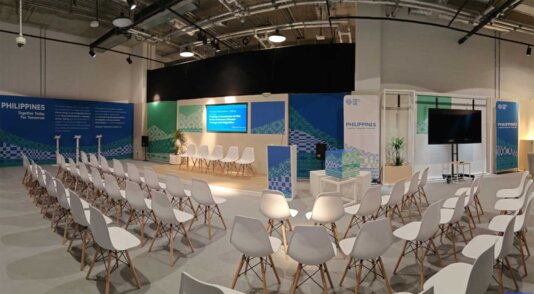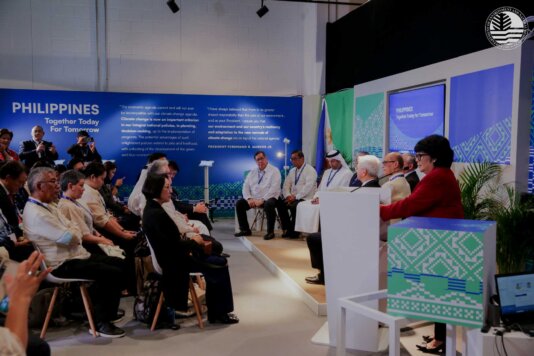- About
- Topics
- Picks
- Audio
- Story
- In-Depth
- Opinion
- News
- Donate
- Signup for our newsletterOur Editors' Best Picks.Send
Read, Debate: Engage.
| December 12, 2023 | |
|---|---|
| topic: | Climate action |
| tags: | #Philippines, #COP28, #climate action, #activism |
| located: | Philippines, United Arab Emirates |
| by: | Augusta Villafuerte |
Traditional textile patterns in shades of blue and green adorn the walls of the Philippines' inaugural pavilion at the United Nations Climate Change Conference COP28 in Dubai.
The annual climate talks offer a pavilion space for member countries to hold events and discussions on the sidelines of the two-week international summit, where world leaders assess progress on climate change response and engage in negotiations addressing the phenomenon.
Following the theme of "Together Today for Tomorrow," the design of the Philippine pavilion aims to illustrate the seamless integration of man-made structures with the abundant natural resources of the Southeast Asian nation and showcase the government's proactive efforts in addressing the impacts of climate change.
The fossil fuel-reliant country has been ramping up its shift to solar and wind sources of energy by 35 per cent by the end of the decade, as it grapples with an ongoing energy crisis.
One of the nation’s sources of natural gas, which is responsible for powering over half of its total population of more than 110 million people, is estimated to run dry by 2027. this is compounded by the struggle to meet the demand of a growing population and some of the Asian region’s highest electricity usage rates.
The country declared a moratorium on coal in 2020 to boost the deployment of renewables amid criticism that its banks continue to invest in ongoing projects.
The Southeast Asian archipelago is highly vulnerable to the impacts of climate change, and is battered by 20 typhoons per year on average. Recognizing its vulnerability, the government submitted to the United Nations (UN) in 2021 its target to reduce harmful greenhouse gases by 75 per cent by 2030.
Local environmentalists, however, have decried that only close to three per cent of this target was pledged to be financed by the government. The rest will be met solely through funding and assistance by the international community.
The pavilion is a symbol of "the country’s commitment to climate action and resilience," said the Philippine environment secretary Antonia Yulo-Loyzaga at the launch of the structure in Dubai on 2 December.
Days before the beginning of COP, the Philippine delegation left for Dubai on a high note with the government’s approval of nearly USD 10 million worth of local funds for climate change adaptation initiatives. This marks the largest allocation since the inception of the People's Survival Fund, a mechanism initiated two decades ago.
But as the Philippines was preparing to publicly display its catalogue of climate solutions, despite contributing less than one per cent of global emissions, grassroots representatives began calling out the Philippine delegation for its supposed "prejudice" in the selection of side event partners at the country's Pavilion.
Leaders of climate vulnerable communities, members of church and faith-based organisations, as well as youth and members of civic movements released a joint statement on 1 December, saying that the Philippine delegation, led by environment secretary Loyzaga, was favouring groups with "pre-existing ties" to the secretary to be included in side events.
The civil society organisations that were given clearance to hold side events are the Forest Foundation Philippines, the National Resilience Council and the Manila Observatory, where Loyzaga sits as either a board member or a chairperson. The remaining side events are hosted by corporations and development partners.
"We are gravely concerned that this illustrates a prejudice against civil society raising critical discussions both at our home country and in annual climate negotiations," reads the statement signed by Greenpeace Philippines, the Philippine Movement for Climate Justice, Center for Energy, Ecology, and Development and Laudato Si’Movement Pilipinas, among others. "This exclusion will only mean that difficult but crucial conversations meant to sharpen positions and raise ambitions will be buried under flashy pronouncements meant to paint the COP participation of the Philippine government a success.
"It also reveals a government unwilling to listen and to be held to account. Whether the delegation represents the best interest of the people also becomes a question."
In her remarks at the pavilion opening, Loyzaga did acknowledge the civil society organisations that participate in the side events. She also mentioned partners like Filipino conglomerate Ayala Corp, whose energy arm is one of the biggest in the country, and the Asian Development Bank, which is based in the Philippine's capital Manila.
Rodne Galicha, convener of the Aksyon Klima Pilipinas coalition, told FairPlanet that it was holding meetings with the department of environment and natural resources on the sidelines of COP28 to discuss why authorities have not been responding to their proposal to be part of the side event plans since August.
"It is crucial for civil society to be part of the pavilion primarily because it represents the country, not only the government but also its citizens," Galicha said. "Civil society has been a strategic partner of the government in nation-building, as we have been the voices of the communities and sectors we represent and serve, and the ecosystems we protect."
Galicha further stated that Aksyon Klima submitted a concept note and four proposals to be included in the pavilion side events, and had to adjust along the way as the department changed its requirements.
The requirements included that side events be "solutions-driven" and co-organised by a government agency that would then submit the endorsement and proposal to the government.
Galicha, who is in Dubai for COP28, said he fears the exclusion of civil society groups like his will inspire a "stigma of being purely an activist network."
Early this year, Galicha led a high-profile protest against a nickel mine that was feared to disrupt the intact ecosystems of Sibuyan Island in the province of Romblon, where he lives.
The protests at Sibuyan came amid the Philippine government’s declaration that it will prioritise exporting processed nickel ore to overseas markets to grow the economy based on the country’s latest five-year development plan despite apparent mismanagement on the ground.
Civil society in the Philippines is historically among the world’s most vibrant and active, and is known for its particularly strong ties with poor communities, Indigenous Peoples and other disadvantaged groups.
In recent years, however, the government’s relationship with some advocacy organisations has been strained following the implementation of the NTF-ELCAC (National Task Force to End Local Communist Armed Conflict), a task force established by former Philippine president Rodrigo Duterte as part of his counter-insurgency efforts.
Since Philippine president Ferdinand Marcos Jr took office in June last year, there have been at least 15 cases of reported abductions of community organisers and environmental activists in the country.
UN special rapporteur Ian Fry called for the abolition of the taskforce during a 10-day visit to the Philippines in November, having learnt how environmental defenders were either abducted or killed by the military.
Galicha said that the ongoing dialogue with the Philippine delegation includes ensuring that civil society organisations in key government-led events such as the hosting of the pavilion are taken into consideration in the future.
It is necessary, he believes, to hold government leaders and other relevant stakeholders accountable for such shortcomings, especially around issues as critical as the climate crisis.
"This is not to create division and chaos to hinder state-led programmes and plans, but instead to help address these gaps that would help strengthen climate solutions in accordance with existing laws and policies," he concluded. "No one should be stereotyped and left behind in climate action."
By copying the embed code below, you agree to adhere to our republishing guidelines.


